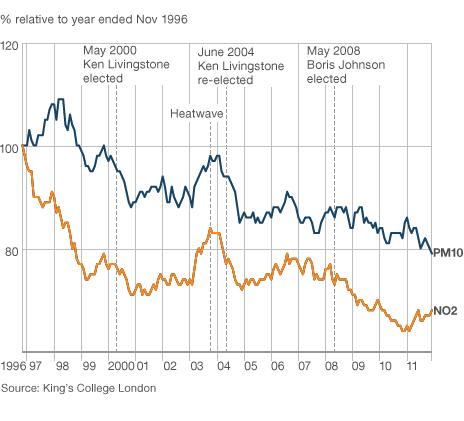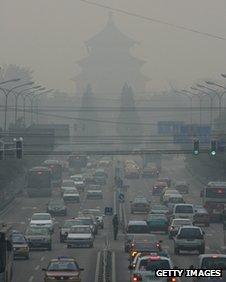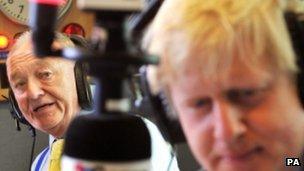London election: Mayors' air pollution records compared
- Published
The statistic makes bleak reading for those who live and work in London.
According to research published by current mayor Boris Johnson, 4,267 Londoners die prematurely each year because of the air they breathe.
So, with noxious gases a hot political issue, how do the records of Mr Johnson and former mayor Ken Livingstone compare?

The BBC asked experts at King's College London (KCL) to collate levels of harmful nitrogen dioxide (NO2) and small particles (PM10) in the air throughout the tenures of the rival politicians.
It is an exercise fraught with difficulty - not least because readings have to be taken all over London and amalgamated by scientists.
But the resulting chart would, at first glance, appear to show an encouraging trend.
Broadly speaking, both pollutants have been in consistent decline.
Yet other data seen by the BBC shows the scale of the challenge faced by the next mayor.
The European Environment Agency found the level of nitrogen dioxide at London's bellwether monitoring station in Marylebone Road was the fourth highest in Europe - out of almost 3,000 locations.
Meanwhile figures collated by the Campaign for Clean Air in London (CCAL) suggest nitrogen dioxide levels between 2000 and 2008 were broadly similar to those in Beijing.
The Chinese capital is so synonymous with air pollution there were worries over the health of athletes at the last Olympics.
Dr Gary Fuller, of the Environmental Research Group at KCL, collated the data in the above chart.

Beijing: not a breath of fresh air
He pointed out that - while it shows pollution declined under both mayors - the speed of improvement actually tailed off about the time Ken Livingstone became London's first mayor in 2000.
Dr Fuller said: "It's safe to say air pollution improved up until the turn of the last century and since then improvements have remained fairly static.
"Unfortunately it might be very difficult to make further progress.
"One of the problems is the number of diesel vehicles on London's roads - the technology to control their emissions is not working as well as we hoped."
Simon Birkett, of the CCAL, attributes the moderate falls in pollution during the last four years to the low emission zone (LEZ) created in 2008 by Ken Livingstone.
It means heavy commercial vehicles that did not meet strict standards have to pay up to £200 to enter Greater London.
Under Boris Johnson, the LEZ charge was amended to include vans in addition to lorries, although he did choose to delay the change for one year for economic reasons.
Mr Birkett said: "Air quality matters - it causes heart attacks and strokes and reduces lung size.
'Deliver cleaner air'
"Pollution might have come down since 2000 but it's still the highest in Europe and more than twice World Health Organisation limits."
Reacting to the analysis, the mayor's spokesman said: "Boris Johnson helped deliver cleaner air for London through cleaner buses, banning the most polluting taxis and tightening the LEZ.
"He also led on massively increasingly cycling across the capital with the bike hire scheme and cycle superhighways.

Ken Livingstone and Boris Johnson have not seen eye to eye during the campaign
"If re-elected he will ramp up this programme with the roll out of 600 new buses, among the cleanest on the planet, planting 20,000 more trees, and further promoting cycling."
A spokesman for Ken Livingstone said: "No-one can claim tackling air pollution is easy.
"But the candidates should be judged on their willingness to take decisive action.
"Ken delivered the ground-breaking congestion charge and the world's largest low emission zone - cutting pollution from cars, lorries, and buses across Greater London."
But Green mayoral candidate Jenny Jones said: "Air pollution is a two-mayor problem and the scale of the health impacts has been vastly underestimated for years.
"Ken Livingstone really dragged his feet before eventually starting to get to grips with it, but Boris Johnson delayed or reversed many of the changes made.
'Greater commitment needed'
"We need a mayor who is honest with Londoners and ensures air pollution is monitored in the right places, publicising bad air episodes widely."
And a spokesman for Liberal Democrat candidate Brian Paddick said: "The fact that levels of damaging particles in the air have more or less stabilised during Ken Livingstone's and Boris Johnson's tenure is far from a ringing endorsement of their policies.
"Any mayor must demonstrate greater commitment to reducing pollution by moving beyond the targeting of 'hotspots' to tackle pollution at source.
"Only then can the health and quality of life of Londoners be assured."